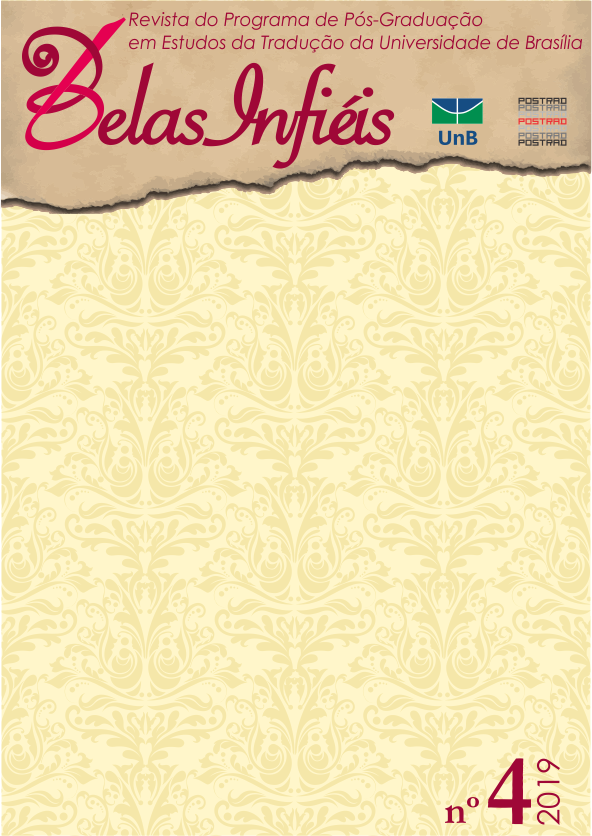José María Arguedas y João Guimarães Rosa frente a los abismos de la traducción
DOI:
https://doi.org/10.26512/belasinfieis.v8.n4.2019.24531Palabras clave:
Traducción literaria. Andes peruanos. Sertón brasileño. Abismos.Resumen
A partir de los escritos y correspondencias de dos escritores considerados transculturadores de la literatura latinoamericana, José María Arguedas y João Guimarães Rosa (Rama, 1989), este texto busca reflexionar sobre los abismos que se plantean en la traducción de obras literarias entre el portugués brasileño y el castellano, en su variante andina. Desde los apuntes de Julio Prieto (2010) y Sanches Baena (2008) la pregunta sobre el estilo en los dos escritores aparece recortada por un agudo sentido de la oralidad con que redactaron sus textos, y que la traducción intentó recuperar en las lenguas de llegada. El examen detenido de las estrategias usadas por ellos para pensar la traducción además de desvelar otras dimensiones de su creación, pone en jaque algunos conceptos esenciales al trabajo traductor, como la relación original y copia y, la fidelidad y originalidad de los textos de partida.
Descargas
Citas
ARGUEDAS, José María. Canto Kechwa. Lima: Compañía de Impresiones y Publicidad Enrique Bustamante y Ballivián, 1938.
ARGUEDAS, José María. Yawar Fiesta. In: ARGUEDAS, José María. Obras completas. Tomo II. Lima: Editorial Horizonte, 1985. p. 69-227.
ARGUEDAS, José María. Introducción a la primera edición. In: ÁVILA, Francisca de. Dioses y hombres de Huarochirí. Narración quechua recogida por Francisco de Ávila [¿1598?]. Traducido por: José María Arguedas. Lima: Universidad Antonio Ruiz de Montoya, 2009.
CORNEJO POLAR, Antonio. Los universos narrativos de José María Arguedas. Lima: Editorial Horizonte, 1997.
ESCOBAR, Alberto. Arguedas o la utopía de la lengua. Lima: IEP Ediciones, 1984.
LIENHARD, Martin. Cultura andina y forma novelesca. Zorros y danzantes en la última novela de Arguedas. Lima: Editorial Horizonte/Tarea, 1990.
MARTÃ, José. Cartas de José Martí a María Mantilla. Obras Completas. v. 20. La Habana: Ed. Ciencias Sociales, 1975. p. 216-220.
MILLONES, Luis; TOMOEDA, Hiroyasu. Estudio preliminar. In: ÁVILA, Francisca de. Dioses y hombres de Huarochirí. Narración quechua recogida por Francisco de Ávila [¿1598?]. Traducido por: José María Arguedas. Lima: Universidad Antonio Ruiz de Montoya, 2009.
NÚÑEZ, Estuardo. El Brasil visto por viajeros peruanos. Lima: Centro de Estudios Brasileños, 1981.
PINILLA, Carmen María (Ed.). Apuntes inéditos. Celia y Alicia en la vida de José María Arguedas. Lima: Fondo Editorial de la Pontificia Universidad Católica del Perú, 2007.
PRIETO, Julio. El margen de la traducción: orillas y cruces rioplatenses. In: BLAS, Amelia et al. El reverso del tapiz. La traducción literaria en el ámbito hispánico. VII Coloquio Internacional. Instituto Cervantes: Budapest, 2008. p. 154-168.
RAMA, Ángel. Transculturación narrativa en América Latina. Montevideo: Siglo Veintiuno Editores; Fundación Ángel Rama, 1989.
ROSA, João Guimarães. Gran sertón: veredas. Trad. Ángel Crespo. Barcelona: Seix barral, 1967.
ROSA, João Guimarães. João Guimarães Rosa: correspondência com seu tradutor italiano Edoardo Bizarri. 3. ed. Rio de Janeiro: Nova Fronteira; Editora UFMG, 2003.
ROWE, William. Ensayos arguedianos. Lima: Centro de Producción Editorial de la Universidad Nacional Mayor de San Marcos/SUR Casa de Estudios del Socialismo, 1996.
ROWE, William. El castellano modificado. In: ROWE, William. Mito e ideologia en la obra de José María Arguedas. Lima: Instituto Nacional de Cultura, 1979. p. 49-63.
TARICA, Estele. El “decir limpio” de Arguedas: la voz bilíngue. 1940-1958. In: FRANCO, Sergio F. José María Arguedas: hacia una poética migrante. Pittsburgh: ILII, 2006. p. 23-38.
SÁNCHEZ BAENA, María Valentina. La escuela de la Manipulación. In: BLAS, Amelia et al. El reverso del tapiz. La traducción literaria en el ámbito hispánico. VII Coloquio Internacional. Instituto Cervantes: Budapest, 2008. p. 100-112.
Descargas
Publicado
Cómo citar
Número
Sección
Licencia
Copyright Statement
Given the public access to this journal, the texts are free to use but requires the recognition of the original authorship and initial publication in this journal to be properly stated.
The journal allows the use of works published for non-commercial purposes, including the right to submit the work to publicly accessible databases. Published contributions are the sole and exclusive responsibility of the author(s).
- When submitting papers to be evaluated by the Belas Infiéis journal, the author(s):
- Declare that the contents of the contributions are original and of their original creation, being entirely responsible for their content if there is an objection by third parties.
- Claim to be aware that they should not commit academic plagiarism.
- Declare that the manuscript has not been published, completely or partially, in Portuguese or another language. If it is a translation it should be submitted to the Translated Articles section.
- Declare that the manuscript is not being evaluated by other journals.
- Declare that the manuscript was not submitted to another journal simultaneously.
- Commit(s) to inform the journal of any kind of error or inaccuracy in their contribution (published, in evaluation or in editing) and to collaborate with the editors to make due corrections of the article (when in evaluation or editing) or erratum/retraction (after publication).
- Declare that there is no conflict of interest regarding the published work.
- Authorize its release if it is accepted for publication without any kind of monetary compensation.
- Agree to assign non-exclusive rights to publication to the magazine, remaining free to make their contribution available in other media as long as the publication of the first version in Belas Infiéis magazine is mentioned. They also authorize Belas Infiéis to assign their texts for reproduction in content indexers, virtual libraries and similar platforms.
- Maintain copyright and grant the journal the right of first publication, the work being licensed under theCreative Commons Attribution License.
- Is/Are allowed and encouraged to publish and distribute their work online after the editorial process, which may increase the impact and citation of the published work.
- Authorize the editorial team to make textual adjustments and to adapt the article to the publication rules, when necessary.



















